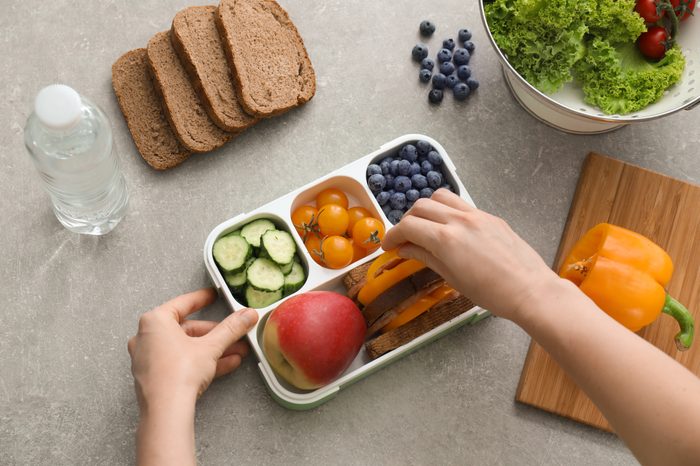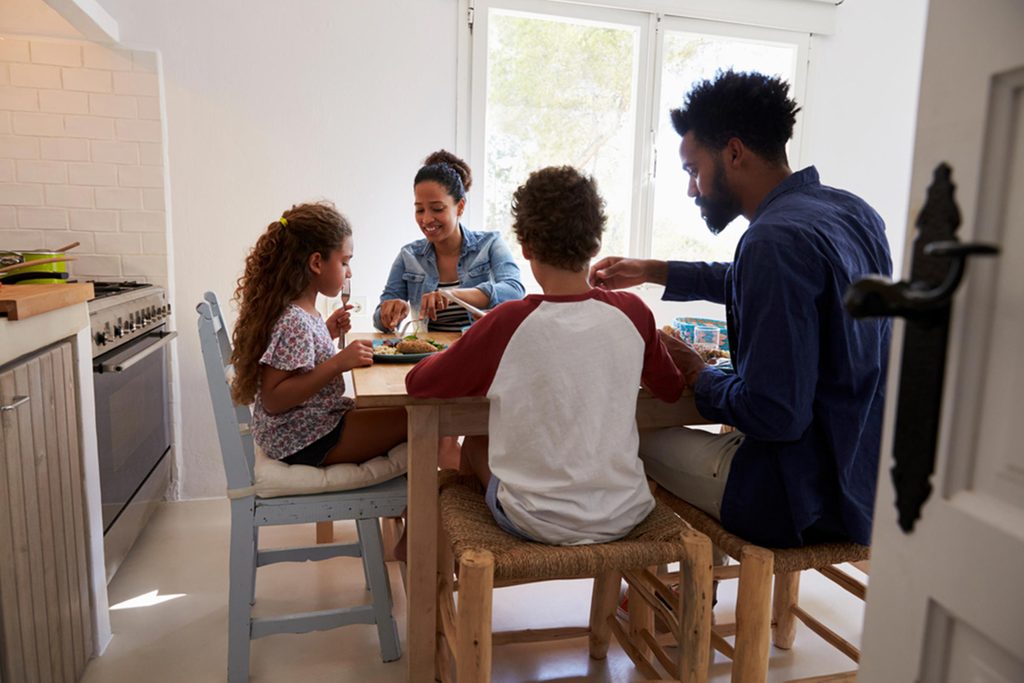Healthy family habits
Making smart choices for your family starts with forming healthy habits together. Here are the habits families can implement to keep everyone as happy and healthy as possible. (And don’t miss these heart-healthy secrets from the countries with the lowest heart disease rates in the world.)

They snack smart
“Parents can influence their child’s food preferences and how well their brain functions with healthy food choices. Research tells us children can have a hard time learning on processed foods. Moms and dads can make it a point to purchase a wide variety of whole foods instead of cookies, crackers, or sodas for an afternoon snack. I make sure our afternoon snacks include organic fruits and veggies such as apples, nut butter, celery, hummus, grapes, avocados, bananas, spinach, and raw pumpkin seeds.” —Connie Rogers, Certified Integrative Nutritional Holistic Health Coach and author. Or try one of these 30 simple, healthy snacks.

They try to eat slowly
“Healthy families don’t rush or stress when it’s time to eat. As a mother of two children, we use calm voices and music at the table, and focus on healthy digestion when it’s time to eat. We also model healthy eating by not shoveling or inhaling our food, making a point to chew after every bite. This one habit ensures we take the necessary time to enjoy the taste, colors, and aromas of what we eat.” —Connie Rogers.

They care for their elders in a loving way
“Caring for an elderly loved one is a wonderful way to show compassion and service, and it doesn’t mean you have to sacrifice everything. Healthy families have boundaries with aging parents and grandparents. They thoroughly think through the potential impact of moving an aging parent into the home or providing extended care. Kids and marriages can be powerfully impacted by how these decisions are handled, both negatively and positively. A good boundary with an aging parent who moves in, for example, might be that the parents and small children will do occasional outings as a nuclear family.” —Jennifer L. FitzPatrick, MSW, licensed social worker and author of Cruising Through Caregiving: Reducing The Stress of Caring For Your Loved One. Thinking about taking on this responsibility? Read our crash course on elder care first.

They try to put the marital or partner relationship first
“Healthy families prioritize the marriage first, over any other relationship—including the kids. Whether it’s having a daily glass of wine after the kids are in bed or a monthly date, they commit to some non-negotiable ritual. When the spouses in the marriage are connecting and communicating, everyone will be happier and healthier.” —Jennifer L. FitzPatrick

They turn off the devices when they’re together
“They spend time together on activities that don’t involve electronics. While watching TV together can be relaxing and offer opportunities for teachable moments, it’s important to identify activities in which everyone can participate on their own level and also promotes conversation. These family activities create tangible bonds as well as lasting memories.” —Lori Ben-Ezra, PhD, a south Florida psychologist

They celebrate each other’s victories
“Healthy, happy families find a way for each child to stand out within the family. They identify their talent and find activities in which each can find success. They then celebrate those victories in a public family forum, whether it be around the dinner table or during the appropriate family activity.” —Lori Ben-Ezra

They cook together
“Making dinner and having a meal as a family should be much more than just cooking and eating. It starts with the cooking, which the entire family can take part in. Preparing a unique healthy meal requires every family member to participate in the shopping, preparing, and cooking process. This journey from vegetable and herb aisle to the kitchen and ending around the dinner table can be a life-changing learning experience around nutrition and health.”—Dean Sherzai, MD, PhD, and Ayesha Sherzai, MD, authors of The Alzheimer’s Solution.

They have great dinner conversation
“The dinner table experience should be just as much about conversation as about consuming delicious and nutritious meals. The conversation could be about a topic that interests the family and provokes thinking, and is often led by the person who has prepared about their topic of interest. Other family members can ask their questions so the presenter learns to improve their presentations, and also how to prepare for complex questions and thoughts.” —The Sherzais

They take morning walks together
“There are few things that are as beneficial to overall health as a brisk morning walk with the family. It energizes everyone for the rest of the day, creates a positive mood, reduces anxiety and depression, increases metabolism, and improves sleep.” —The Sherzais

They eat a meal together every day
“Pick a time when you can all be together to spend quality time connecting. Dinner time is an obvious time to sit down and enjoy a meal together along with each other’s company. However, if you are not all home together at this time, pick another time such as breakfast. The time you gather together every day as a family to connect with each other should be consistent so that everyone can expect the time together and look forward to it.” —Meredith Sagan, MD, MPH, psychiatrist and addiction specialist. To reinforce healthy habits, this is a good time to practice mindful eating habits.

They cultivate an attitude of gratitude
“Healthy families set a culture around being grateful for the things you appreciate in life, big and small. Set up a sacred space where at the end of each day, each family member share what they are grateful for. This sets up an atmosphere of appreciation and good vibes in the house that all can benefit from.” —Meredith Sagan

They grow a family garden
“Working together in a family garden is a great way to get outside, spend time together, and learn about new foods. It also provides a great opportunity to escape screens and play outdoors.” —Rachel K. Johnson, PhD, Professor of Nutrition, University of Vermont and spokesperson for the American Heart Association

They have a safety plan
“Safety is always a concern and so parents should make it a priority to have open discussions with each other and with children in an age-appropriate way about how to stay safe. Whether it is the position a baby sleeps in, immunizations to prevent illnesses, children playing with fireworks, teens with drugs or sex, drinking, and driving, or other hot button issues, the constant theme is that a safety plan is an important part of good health.” —David Cutler, MD, family medicine physician at Providence Saint John’s Health Center in Santa Monica, California

They prioritize happiness over having
“Happiness may not seem like a health issue, but it is. As happier people are more likely to be motivated to change behaviors to improve their health. Happier kids do better in school. It is important to recognize the spiritual rather than the material roots of happiness. Happy people generally are more forgiving, more appreciative of what they have and most importantly they derive meaning from what they do in life. And when families are happy they generally practice healthier behaviors toward diet and exercise which also leads to better health.” —David Cutler.

They take after-dinner strolls
“Healthy families stay active together. One great way to do this is instead of propping up on the couch after a meal, go for a walk. A brisk after-dinner walk can lower the risk of heart attack, stroke, and diabetes. Walking also has many benefits for the brain, like mood and memory.” —Vinh Nguyen, MD, family medicine physician at Orange Coast Memorial Medical Center in Fountain Valley, California

They play games together
“Adults can model good sportsmanship and exercise by joining in when their kids play tag, soccer, run around the park, or even do an ‘exergame’ session like Wii Fit together. Showing kids how much fun an activity can be helps them have more fun and be more interested in the activity.” —Melissa Halas-Liang, RDN, dietitian at SuperKidsNutrition.com.

They may use a gadget basket
“Healthy families make time together into quality time by paying attention to each other and not their devices. One way to do this is to place a basket, box, or other household container just out of reach of the table. Before sitting down, anyone with a phone or other gadget places it on silent and pops it into the basket. This way, kids learn the durable skills of patience and how to have a conversation and parents can observe day to day and may detect earlier if a child needs help with a problem or issue. At holidays, throw a phone party by inviting visitors to stow their devices in the basket, too.” —Jenifer Joy Madden, health journalist, digital media professor, tech hygienist, and author of The Durable Human Manifesto: Practical Wisdom for Living and Parenting in the Digital World

They banish phones from bedrooms
“The American Academy of Pediatrics recommends that digital devices should not be in a child’s bedroom at night. Some kids might argue, however, they need their phone to wake them in the morning. To solve that problem, give your child a good old-fashioned alarm clock. That way, a kid won’t be awakened by beeps in the night. By charging their devices in the kitchen, hallway, or bathroom, kids also learn the digital age skill of being able to peacefully separate from their devices.” —Jenifer Joy Madden.

They create fun family traditions
“Healthy families create unique family traditions. Having a regular board game night, taco Tuesday, or a weekly trip to the movies not only helps them spend time together but creates opportunities for conversation and making great memories.” —Kelsey Torgerson, MSW, licensed social worker at Compassionate Counseling St. Louis

They manage stress together
“They make time for relaxation at the end of the day, incorporating some family yoga, mindfulness practice, or even just reading a story together at bedtime with your younger ones. Make sure that everyone is checking in with and then addressing their stress levels, this benefits both physical and mental health.” —Kelsey Torgerson. Speaking of healthy habits, here are healthy reasons to do yoga with kids.

They keep treats out of sight (and out of mind)
“What you see is what you want to eat. So keep healthy snacks highly visible in your kitchen and put the sugary treats out of sight. Leave colorful fruits and vegetables out on the counter or on the most visible shelves in the fridge so that when you’re hungry, you’re more likely to reach for a nutritious snack. Blueberries are one of my favorite options for both adults and kids.” —Sonali Ruder, DO, emergency room physician, chef, and founder of The Foodie Physician. Maintaining a healthy weight is just one of the healthy habits you can encourage in the kitchen. Check out these other weight-loss tricks approved by nutritionists.

They have screen-free days
“We have Screen free Sundays in our family so that we can focus on having fun and building a connection with one another without the distractions. Turning off our technology frees us up to do much healthier things for our minds, bodies, and our relationships with one another.” —Amy Carney, parenting expert and family blogger

They praise progress, not just achievement
“A healthy habit is for family members to focus on each other’s progress and successes instead of their weaknesses. For instance, if they are working towards cleaning their room five times a week but they only do it three times that week, praise them for their effort instead of criticizing them for the two days they missed. We all respond best to praise and it will show the individual that their effort is being noticed. This boosts self-esteem as well.” —Emily Griffin, MA, licensed certified professional counselor in Germantown, Maryland

They talk frankly about money
“Money is a third rail in many families—and it shouldn’t be. Healthy families don’t pretend when it comes to money, and they don’t avoid the topic. They have conversations and make family decisions together about money based on behavior and goals, not shame, guilt or fantasy. Whether it’s allowance, vacations, or downsizing, healthy families discuss money and they make adjustments for windfalls, tough times, and behavior. When families avoid money talks and money decisions, they’re running a default program, and this isn’t healthy for anyone in the family or for the family as a separate entity.” —April Masini, relationship expert and author.

They put the “active” in “activity”
“Plan family activities that include movement. It doesn’t have to be straight ‘exercise,’ but going to a museum, a park, a beach, or a zoo promotes better health than going to a movie (where popcorn and soda are almost always present!). The entire family gets exercise and quality time together.” —Laura Arndt, certified personal trainer specializing in families and co-founder of Matriarc

They see the best in each other
“It’s crucial for families to take time to share all the things they love and appreciate in each other. Sharing what they appreciate in their family members helps to dissolve petty irritations and makes the more challenging interactions easier to manage.” —Bailey Gaddis, certified hypnotherapist and author of Feng Shui Mommy: Creating Balance and Harmony for Blissful Pregnancy, Childbirth, and Motherhood

They get (a runner’s) high together
“Engaging in a planned physical activity together, like hiking or running a 5K, at least once a week can help to reset perceptions of one another. This works because they’ll begin to associate spending time with their family with feeling good and being charged with endorphins.” —Bailey Gaddis.

They drink together—water, of course
“In our home, we purchased water bottles for each of our children. We encourage our children to drink plenty of water throughout the day. Since we can glance at their water bottles and tell if the levels have decreased, we can help encourage them to stay hydrated. Healthy families encourage and make it easy to drink lots of water daily.” —Joe Rawlinson, parenting expert and author of Dad’s Guide to Raising Twins

They have family finance meetings
“Creating regular, disciplined meetings about family finances can take the heat out of money arguments. It’s also important to have honest conversations about how family members’ emotions are tied to spending and saving habits and how the family can work together to accomplish their financial goals.” —Joe Duran, CEO of United Capital

They never eat alone
“In our crazy, overscheduled world, this may seem impossible, but if you make it a rule that nobody in the family eats alone, it helps physical and mental health. This may mean that one parent waits to eat with a child who is at a sports practice until late while the other parent eats with another child who gets home earlier and is hungry. You have to find the algorithm that works for your family. Also, technology doesn’t count as company so get everyone at the table to turn off their devices and put away books and newspapers.” —Liza Baker, health coach, professionally trained chef, and cookbook author.

They try sushi together
“Parents can encourage cultural awareness and healthy eating by trying out different restaurants as a family. This is a fun adventure but also helps kids try new foods and cuisines.” —Becky Blake, PhDc, psychoneurologist and the “real life Mary Poppins”

They dream big
“Come up with a wish list of ten things that you would do, buy, meet, or have if you had a billion dollars and no time constraints. Encourage kids to think big and be as crazy as they like. Children as young as three get a kick out of playing this game and it helps families learn about each other as well as make goals together.” —Becky Blake

They give back together
“Doing community service together is one of the best ways to build family unity while teaching core values. Find something family friendly like volunteering picking up trash at the beach or working at a food bank.” —Becky Blake.

They ask a lot of questions
“Healthy families are curious about each other and the world around them. Family members are encouraged to ask questions about anything on their mind, including the perpetual ‘Why?’ questions. They also ask each other questions like ‘What was the best part of your day?’ and ‘What was your biggest struggle?’ Every person should feel comfortable asking questions.” —Thomas Gagliano, MSW, parenting expert and author of Don’t Put Your Crap In Your Kid’s Diaper

They fight fair
“Healthy families will create a safe environment for healthy communication, where each individual feels like their feelings are acknowledged and validated. When conflict inevitably arises, they don’t have to agree with each other but they still need to acknowledge each other’s feelings. They know they can have conflict and still feel their opinion is valued. They also learn tools for how conflicts can be resolved. No one shuts down, runs away, or rages when there is disagreement. They work it out.” —Thomas Gagliano

They aren’t controlling
“Healthy families don’t try to control their children’s behavior. Instead of micromanaging every detail, parents supply their children with the tools necessary to control their own behavior. For example, we want our children to say no to drugs because they understand the risks and want to say no to drugs, not just to please us. Eventually, children will be on their own anyhow so we need to teach them the skills to be independent.” —Thomas Gagliano.

They eat pizza sometimes
“Family meals model for kids that carving out time to take care of oneself with food is important. It also shows them that you value connecting with them and are willing to put in an effort to make it happen. But too many families are stopped because they don’t have the ‘perfect’ meal prepared. Healthy meals are ideal but the benefits of eating together are so important that even a pizza picked up on the way home and eaten together around the kitchen island works. Research shows a myriad of ways that eating together can support physical, mental, and emotional health. Kids whose families eat together are even less likely to get involved in drugs, have better grades, and have healthier bodies.” —Adina Pearson, RD, family dietitian and author of Healthy Little Eaters

They have parents who walk their talk
“Parents, don’t expect your children to do things differently than you do. If you smoke, it’s hard to ask your children not to. Same goes for drinking alcohol or taking pills. If you overeat or eat lots of processed foods, it’s nearly impossible to get your kids to eat less and eat whole foods. Healthy families know the truth in the old saying, ‘Like father, like son’.” —Barbara Bergin, MD, board-certified orthopedic surgeon in Austin, Texas

They skip the baby talk—unless they’re actual babies
“Talk to your children, and talk often, about important things: life, science, the amazing world we live in, news, and even politics. As soon as possible, quit baby-talking, especially to girls. We tend to baby-talk to girls longer than we do to boys and so girls end up baby-talking much longer, and even indefinitely. Use your regular voice with your children. Ask them their opinions or ask them to think through problems. Avoid making disciplinary and advice-giving conversations, the only ones you have with your kids.” —Barbara Bergin

They support each other in their health goals
“Healthy families respect individual family member’s approaches to getting and staying healthy, even if it is not what the other family members have to do or choose to do. For example, one person might follow a specific diet or exercise routine. The whole family doesn’t have to do this but the rest of the family should support them in their efforts and not sabotage their diet and exercise goals.” —Lisa Hugh, RD, dietitian based in Maryland. Healthy habits include helping your family members achieve their best without making them feel bad. To encourage healthy habits, learn the smart and sensitive ways to talk to kids about weight.

They know their family health history
“It’s important to pay attention to the health histories of the individuals. Knowing and understanding each person’s history can help you understand your own risk as well as help you take care of other people in your household. Families should be open about conditions, diseases, and other risk factors, even ones that may be hard to talk about, like depression.” —Lisa Hugh

They have regular family councils
“Schedule a weekly family meeting to discuss the upcoming week and what went well or did not the previous week. This allows the family to touch base and teach the children communication skills. Go over the family calendar for the upcoming week and find places where you can work in healthy choices, like going for a family walk on a less busy evening or packing healthy meals ahead for busy days.” —Kim Martinez, MS, child and family counselor in Lutz, Florida.

They do parent-child date nights
“Date night with your partner is very important but don’t stop there. Make regular dates with each of your children alone. Let them plan (within budgets) what they would like to do. Rotate the individual date nights so each child gets to feel special. Don’t take this special time away as a punishment. This special time encourages deeper connections with your child and lets them know you love them unconditionally.” —Lisa Steinhilber EdS, licensed professional counselor at 360 Counseling & Wellness Center

They eat whole foods
“Healthy families make it a priority to cook and eat real food that is minimally processed. This has countless benefits: whole food is higher in nutrients, antioxidants and is less inflammatory.” —Wendie Trubow, M.D., M.B.A., President at Five Journeys.

They make a game of grocery shopping
“Healthy families make grocery lists and shop together. Kids can grow to love and look forward to shopping trips where they are challenged to ‘find two purple veggies to eat this week’ or ‘please get two of the ugliest fruits you can find for us to sample this week’. Everyone gets input and then everyone is invested when the food comes home.” —Andrea Crane, MS, licensed, clinical nutritionist and functional medicine practitioner at In All Your Ways LLC

They turn carpool time in quality time
“Driving your child to games, sports, or other activities is an excellent way to connect with your child. Even in a quick car ride, it is possible to learn quite a lot by having small meaningful conversations. Also, that rear view mirror is an excellent way to look at your child’s nonverbal cues. Car time has given me a huge insight to my daughter’s life, even with friends in the car. Being able to disconnect and talk with your child in a quiet environment like a moving car can be an excellent time to bond.” —Elizabeth Trattner, AP, Chinese and Integrative Medicine.

They fill up the “love tank”
“Healthy families have a quiet, cozy, bedtime ritual. After dinner, bath, and brushing teeth, they meet in a quiet room and at least one parent should lie with the child and reflect on the day. Ask questions and share your favorites and gratitudes for the day. This is a time that fills our kids’ love tanks to get them through the night. It’s a great way to end the day, especially if there has been a lot of disciplining or arguing. It’s a great way to end the day on a comforting note.” —Bette Levy Alkazian, licensed marriage and family therapist

They say they’re sorry
“Children should apologize when they do something wrong but parents should also apologize when they’ve wronged their child, which repairs the rupture in the relationship. This may not feel natural for parents to do, however it goes a long way in the relationship between the parents and children.” —Tyra Butler, Licensed Marriage and Family Therapist. Here are 10 more ways to raise an empathetic child.

They vacation on the regular
“Healthy families take vacations often. Spending time together as a family in a fun, relaxing atmosphere binds family together. It gives the opportunity for deep conversations, teaching moments and laughter. Spending time with the family in a relaxing atmosphere reduces stress and improves mental and physical health.” —Lilia Arnest, Holistic Nutrition Consultant

They share meal planning
“Each member of the family gets to choose what’s for dinner one night a week. The only rule is that a protein, vegetable, and healthy grain or starch must be included. This gives the kids the power of deciding what the entire family eats, along with learning to accept and appreciate what the other family members decide on for their meal.” —Nicole Meyer, cookbook author and founder of Nibbles By Nic.